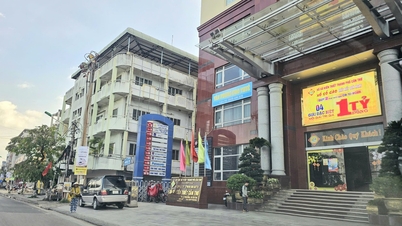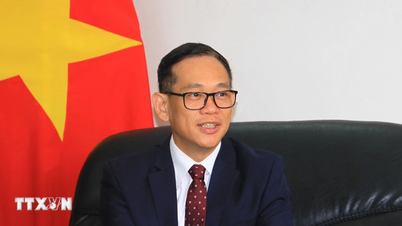Enough ways to stimulate demand
To stimulate credit growth, commercial banks have implemented many programs and solutions to support businesses and people. Specifically, after a week of implementing the 7,000 billion VND package with interest rates from 8.8%/year, BVBank recently continued to implement a preferential loan package with a reduction of up to 2%/year with a scale of 1,000 billion VND for small and medium enterprises with interest rates from only 8.5%/year.
Similarly, Sacombank is offering a VND30,000 billion credit package for individual customers with interest rates starting at 7.5% per year for production and business and 9% per year for consumer loans; and a VND11,000 billion credit package with interest rates starting at 6.2% per year for businesses to borrow to develop production and business.
In addition to implementing a VND3,000 billion credit package for the forestry and fishery sectors with interest rates 1%-2% lower per year than the normal interest rate, Agribank has also allocated an additional VND10,000 billion with an interest rate 0.7% lower per year than usual for small and medium-sized enterprises to borrow additional working capital to implement production and business plans...
Mr. Dinh Ngoc Dung, Deputy Director in charge of Corporate Banking ofSHB , said that not only does SHB implement short and medium-term credit programs for manufacturing and trading enterprises with interest rates up to 2%/year lower than normal loans, SHB also simplifies the lending process, reduces costs to lower lending interest rates to support businesses and people. In addition, SHB builds its own "tailored" program for each corporate customer to stimulate credit demand.
Mr. Tu Tien Phat, General Director of ACB, informed that in the first 6 months of 2023, ACB has implemented many credit stimulus solutions through preferential loan programs of 30,000 billion VND, interest rates reduced by a maximum of 3%/year compared to the interest rate schedule, widely applied to all customers, without limitation on subjects or fields.
“Reducing lending interest rates will ensure credit growth, reduce the risk of bad debt and contribute to promoting the development of the domestic economic sector. ACB will continue to implement solutions to further reduce lending interest rates to support businesses and people to recover and develop production and business,” said Mr. Tu Tien Phat.
Don't be too lax.
According to estimates from securities companies, lending interest rates have decreased by about 1.5%-2% since the beginning of the year. Mortgage interest rates offered by many commercial banks are only 7%-8% per year, but in reality there is still a clear differentiation. For manufacturing and trading enterprises with good credit quality, lending interest rates have fallen to a low level of below 10%; but for enterprises with low credit quality, interest rates when borrowing from banks still reach 12%-17% per year.
Dr. Can Van Luc, chief economist of BIDV, recommended that in order to stimulate credit demand as well as support economic growth, there needs to be effective coordination between fiscal policy and monetary policy as well as other macroeconomic policies, while at the same time correctly assessing the current situation of enterprises to remove existing problems and obstacles.
In this context, Dr. Le Xuan Nghia, an economic and financial expert, commented that one of the biggest risks of the Vietnamese economy today is that lending interest rates are still high, many businesses are having to pay interest rates of over 10%/year even though the State Bank has made many efforts to reduce operating interest rates.
However, according to Mr. Nghia, it is likely that the Fed will stop raising interest rates at the end of this year and may reduce interest rates from the end of next year. Europe may also stop raising interest rates from the end of this year because inflation is falling faster than expected. This is an opportunity for the State Bank to further reduce interest rates to support businesses.
Regarding whether or not to loosen monetary policy to support economic growth, Mr. Tran Ngoc Bau - CEO of Wigroup, a financial data and market research provider, commented that in the current difficult economic period, it is most urgent to release capital for the economy and loosen regulations for the banking system, because falling into a "declining circle" will be very difficult to escape.
However, Mr. Bau is also concerned that boosting credit in the current weak demand situation will inevitably lead to credit flow deviations, running into risky areas. However, this is a necessary solution to relieve the capital shortage in the economy. Once everything is more balanced, we can consider readjusting the plan.
Meanwhile, Mr. Nguyen Ba Hung, chief economist in Vietnam of the Asian Development Bank, said that although the SBV's interest rate reduction policy has had a positive impact on the market, credit growth in the first 7 months of 2023 is still low, showing that the effectiveness of interest rate reduction depends on the economy's credit demand. Therefore, the regulatory agency needs to have a flexible credit support policy but should not be too loose, because it can cause an "asset bubble" when money flows not into the real economy but into speculative products.
According to Mr. Hung, when a business's production and business activities have not yet generated profits higher than the loan interest rate, the business still does not borrow capital to invest and serve production activities. Accordingly, the impact of monetary policy on aggregate demand is only an indirect impact through credit supply, while the impact of fiscal policy and policies to stimulate consumption and stimulate private investment will directly impact activities in the economy.
Source


![[Photo] General Secretary To Lam receives Vice President of Luxshare-ICT Group (China)](https://vphoto.vietnam.vn/thumb/1200x675/vietnam/resource/IMAGE/2025/11/15/1763211137119_a1-bnd-7809-8939-jpg.webp)
![[Photo] Prime Minister Pham Minh Chinh meets with representatives of outstanding teachers](https://vphoto.vietnam.vn/thumb/1200x675/vietnam/resource/IMAGE/2025/11/15/1763215934276_dsc-0578-jpg.webp)







































































































Comment (0)